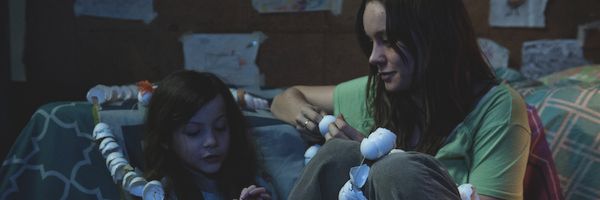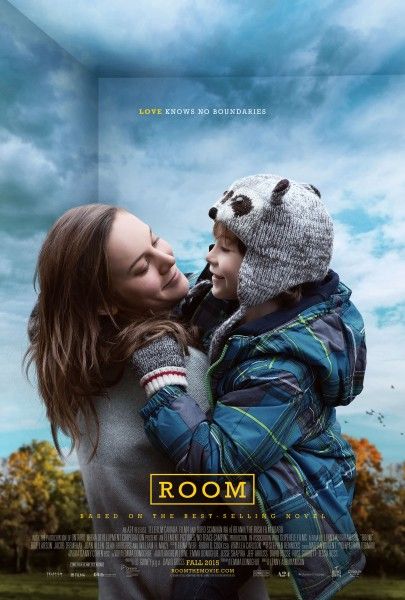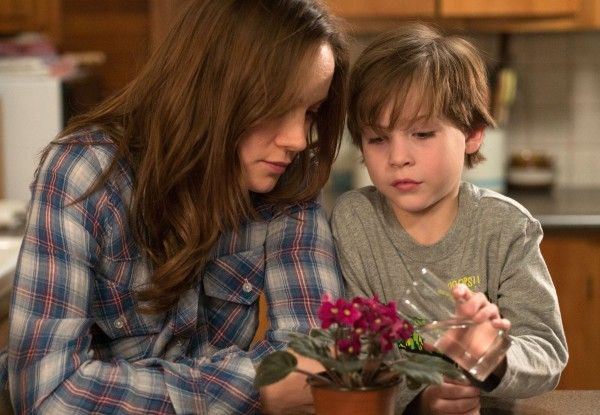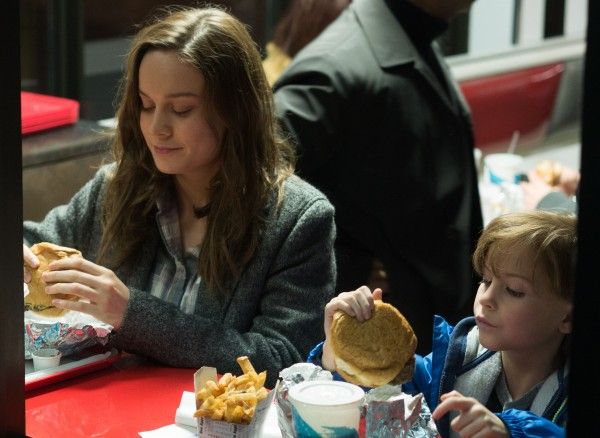From director Lenny Abrahamson (Frank) and author/screenwriter Emma Donoghue, Room is both a chilling and hope-filled story about the love between a mother and her child. Jack (Jacob Tremblay in an unforgettable breakout performance) is a 5-year-old that is looked after by his loving Ma (Brie Larson), who tries to keep her son happy and safe while they are trapped in a tiny windowless space they call Room. But as Jack’s curiosity about their situation grows, he begins to wonder what might really be out beyond their walls.
During a conference at the film’s press day, actress Brie Larson (who gives an emotionally pitch-perfect performance as Ma) talked about her reaction to this story, the beauty in living in a small space, getting into the mind-set of this character, defining Ma, what she learned from isolating herself, and working with Jacob Tremblay.
Question: What was your reaction to this script, when you first read it?
BRIE LARSON: I had read the book, maybe a year prior. One of the mysteries of the book is Ma because she is seen through Jack’s eyes, so she’s a saint, she’s so ethereal, and she’s like a faceless feminine essence in the story. And so, I was very curious, when I heard it was being made into a movie, as to who that face would be. I never pictured that it would be my face. But the thing that I was so drawn to, by the book and then the screenplay, was the myth that was there. This was not just a story about a crime tale. This was Rapunzel. This was Bluebeard. This was Demeter and Persephone. It was all of these reference points that I loved so much, that were woven into the story in such an innocent and delicate way.
Sometimes you pick up on the myth and it’s just an accident. I think it comes naturally out of people, and some people are aware of it. I was lucky that when I sat down to meet with (director) Lenny [Abrahamson], he understood it in the same way that I did and was interested in exploring the same aspect of this story, taking something that was a story that we had seen in the news and reminding us of our roots and where we came from. It was about making this a really universal love story, and a story about growing up and the pains that go with it.
There is beauty in living in a small space, as a child. Some aspects of it are so beautiful, and it’s so nice to not see the darkness. But then, in other ways, there’s a whole range of experience that’s being missed because of it. So, after we had our long discussion about mythology and we shared pictures of our dogs and we started a good working relationship, he asked a small group of women to come in and read for Ma. It was just such a lovely time for both of us to see if this was a proper working relationship and if we could really capture what Ma was, even though we were working with just an audition, which isn’t quite as in-depth as when you’re actually making the thing. And then, a week or so later, I got the call that I got the job.
What did you do to get into the mind-set of this character?
LARSON: The experience of making a movie, you start to see it everywhere. It’s just this amazing mechanism that your brain does because it just so badly wants to be helpful and keep all the information that you need as accessible as possible. So, over the course of the seven months that I spent filling my brain with everything that was her, I was really changing the neurological patterns of my brain, so that all of this stuff was accessible to me. By the time we hit the set and were shooting, I didn’t have to think, “Oh, my wrist hurts. There’s this dark past that’s happened to me. I have a lack of vitamin D. I have to remember that someone is going to be at the door.” It becomes so ingrained in you that you just know it. Your brain works as if you were functioning as this other person. And because of that, you have to be quite gentle with yourself and very understanding that you are just being a vessel for somebody. And so, it’s important to allow yourself to go down the road of being that vessel, while having a very clear understanding that it’s not you and it’s not your problems.
It’s like when you hang out with your friend who’s going through a dark depression, and you can leave your lunch going, “Now I feel depressed.” You have to find a way to shake it off. There are many things I did, like really being very open with my friends and family and making sure that they call me constantly and remind me of what my name is and send me care packages. I even would go so far as to take a piece of paper and draw a line down the center of it and write Brie and Ma at the top, and just list all of the things that were me and all of the things that were Ma. And then, you can very clearly call back on it. I found that, personally, learning more about the brain helped me a lot because it didn’t seem like I was going down a deep, dark path. It was just my brain trying to be really helpful and going, “Oh, you want to be able to access the pain of sexual abuse? Here, we’ll put that right out in front.” And then, later you have to be like, “Okay, great, thank you. Let’s move that into another storage facility that I don’t have the key to anymore. Thanks.”
Ma is so defined by her relationship with Jack. How did you define her for yourself?
LARSON: There are a couple of layers to Ma. There’s Ma who’s Joy, who was from birth to 17. I spent a lot of time trying to figure out who she was, and I ended up writing three journals as her. One from when she was 10, one from when she was 14, and another when she was 16 or 17, just to get back into that mind-set, and to remember what her hopes, dreams, goals and fears were, at that time. And then, there were the two years of isolation before Jack comes along, so I stayed at home for a month and just sat with myself and saw what would come up. I imagine that there was a lot of time for her to reflect, to magnify, to forgive and to create a fantasy, as to what that past was. She almost glorified some aspects of her life, and in other ways, felt remorseful and frustrated about not being able to go back to it. And then, she hit this really depressing low point where she cried and cried until she couldn’t stop, until she discovers that she’s pregnant and there’s this new thing to live for and fight for that’s outside of herself.
I had some amazing conversations with my mom, and I’m of the age where a lot of my friends are having children of their own. I got to speak to them about this turn that happens where suddenly there’s not time to wallow. Your heart grows three sizes and suddenly there is this thing that is a piece of you that’s growing outside of you, that you have to love, nurture and protect, and at the same time, try to explain what the world is. Because of that, she created this mythology for Jack that there was nothing outside of this room, not just for Jack, but for her. He could be the re-imagining of this space, and she could go down that pathway and see the world with fresh eyes, or see Room with fresh eyes again. And then, from there, I spent time with Jacob [Tremblay] and we created our own relationship.
What did you learn from isolating yourself?
LARSON: It started in trying to understand those two years of basic silence, of being alone in this place. I meditate, so I was a little familiar with trying to get to mental silence and how hard that is. And then, I have some friends who have been on silent retreats and I was fascinating by the reactions. Some of them could go ten days, and they’d do it every year because it’s this time they absolutely love. You’re not allowed to speak to or look at anybody because that’s also seen as a form of communication. There’s no connection to the outside world. But I have other friends who couldn’t last 24 hours, and they just panicked and left. There’s this sense of sitting with yourself, and imagining Ma at 17, 18 or 19 years old, sitting with herself in a way that most teenagers don’t. That’s a period of time where it’s all just getting away from everything, wanting to move out, and pushing away a parent. It’s about taking this bizarrely mature experience and set it in a horrible setting, and having to come to terms with who she is now as this new individual she’s become that’s completely separate from her friends, her home and her parents. And then, she has a child and her next identity becomes being a mother. For me, it was just about trying to see what that felt like, with the painful moments of it and the beautiful moments of it. Having that time to just very simply reflect, I felt like it became a huge part of getting to know her better. But, it wasn’t painful. I’m a homebody, so I found it fun, to be honest. I didn’t mind it.
What was it like to work with someone like Jacob Tremblay? What do you think that added to your performance?
LARSON: You remember that there’s this sense of play and an ease to all of it. We were telling a story that has some delicate and dark material, but we didn’t need to dig that far into it. He didn’t pick up on it. So, in the same way that I think he brings this perspective of innocence and light to the movie, it’s exactly what he brought to the set. It’s very easy to not get too dark or too serious because you’ve got him around, who’s constantly making jokes and making fun of the process.
Did it help you to shoot all of the scenes in Room first, before venturing outside for the rest of the story?
LARSON: It became such a vital aspect of it ‘cause you could feel everything that was happening in Room, especially because we had a crew of six. It was such a small space that every day that we shot in Room, you could feel more and more agitation with the crew and with all of us in this small push, and this push to get out. By the time it hit, doing the escape sequence, they were like, “Brie, get us out of here. Get us home.” The crew would talk a lot about how they just couldn’t wait to get out of Room. People would be like, “You must be really excited to get out of Room. It’s going to be so much easier for you.” And I remember thinking, “No, I’m pretty sure that’s not how it’s going to go.” And it wasn’t.
Room opens in limited release on October 16th, and nationwide on November 6th.





